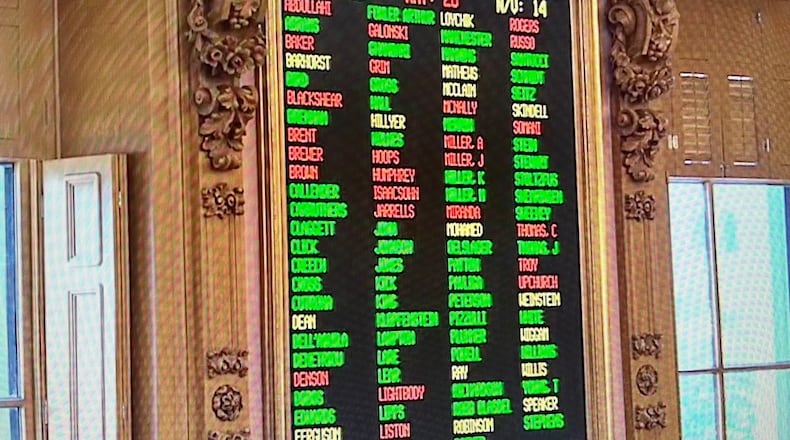Just prior to the session starting, Hall sent a text to the Journal-News that said “it’s getting pulled” from the agenda. About an hour into the session there was an unscheduled call for a majority caucus. When they returned from the lengthy recess, the bill came up for consideration.
Hall told the Journal-News the issue was on the schedule Wednesday morning, they only had 28 confirmed votes for the bill — and eight Republicans were absent — but needed 50 for it to go to the floor for a vote, “52 really, because two might flake on you.” After many phone calls, they had 49 votes an hour before the session was scheduled to start.
He said after the mid-stream recess they had convinced enough representatives to back the bill.
After the recess Hall made a pitch to his colleagues to pass the bill that revises the way property values adjustments are calculated.
“This critical legislation came as a result of recent increases in property valuations, all resulting in steep property tax increases throughout several Ohio counties …,” Hall said. “There is no doubt that this projected increase would hurt the vast majority of my constituents.”
Rep. Daniel Troy, D-Willowick, who has been a naysayer throughout the committee hearings, noted the county auditors and treasurers associations oppose the bill because it will hamper their ability to get tax bills out in time next year. As a result, “there will be a lot of local government entities out there that may be in need of that first tax payment in 2024 that’s not going to be coming.
“It is indeed well intentioned, I think we’re all on the same page, but in their opinion and my opinion it is not ready for prime time,” Troy said. “For every reaction, for everything that is done in the property tax system there’s a counter reaction that takes place.”
It has always been called a “band-aid” solution to “stop the bleeding” while the legislature works on lasting tax reform.
The Journal-News asked Gov. Mike DeWine’s press secretary Dan Tierney what his boss thinks about the legislation. He said it is obviously a very complex issue and they can’t lose sight of the fact all state taxpayers must be treated equally.
“It is a difficult issue in that when the valuation side of it is being discussed, there are 86 counties that would benefit from this but two that would not and would have higher tax bills if calculated this way,” Tierney said. “So those are things the general assembly has to consider and the governor has to consider, taking the time to analyze this issue properly, especially because it effects local governments and local schools.”
Now the legislation travels to the senate for approval, there will be more committee hearings in that chamber. If any changes are made along the way it has to come back to the house for concurrence.
The Ohio Homeowners Relief Act is a response to historic taxable property value hikes — initially upwards of 40% in some counties — expected in counties undergoing reappraisals in the wake of pandemic-induced skyrocketing property values. Taxable values are currently projected to increase 37% in Butler County, 34% in Montgomery County and 29% in Greene County.
It would do this by mandating a three-year, equally weighted average when county auditors value property, instead of just relying on sales from 2022. The equally weighted data produces an estimated average 25% hike for Butler and Montgomery counties, 28% for Clermont and 22% for Greene County and cut tax revenues to local governments and schools by $539 million over three years statewide.
Montgomery County Auditor Karl Keith has not favored the legislation in part because much of their work is already complete. He said he is happy it wasn’t passed as an emergency measure so there is time to ensure they can “make it work and make it work accurately.
“My main concern has always been that HB 187 does not do enough to help taxpayers. Next year, many Montgomery County property owners will see some of the highest tax bills they have ever seen even if HB 187 is enacted into law,” Keith said. “I would like to see our legislators consider more comprehensive measures that would provide relief to the greatest number of taxpayers.”
Hall had hoped to pass the legislation with an emergency clause to have the bill take effect immediately — instead of the 90-day effective rule — after the governor signs it, but he would have needed 66 votes.
Republican Sen. George Lang of West Chester Twp. authored the twin bill in the senate — largely so senators would know what they were dealing with when HB 187 came over. He told the Journal-News he is confident they can get the bill passed through their chamber on Nov. 15 and ready for DeWine to sign the next day.
They don’t want to try to insert an emergency clause on their end because the bill would have to return to the house. Instead he said he plans to “tweak” another bill that would allow them to credit taxpayers on their second half tax bills for the bigger bills they’ll pay in the first round.
”It’s a little clunky at the end of the year, assuming we are successful on Nov. 15 and the governor signs it,” Lang said. “At the end of year every taxpayer will have some relief but they won’t get the full relief until the second half bills go out.”
About the Author

